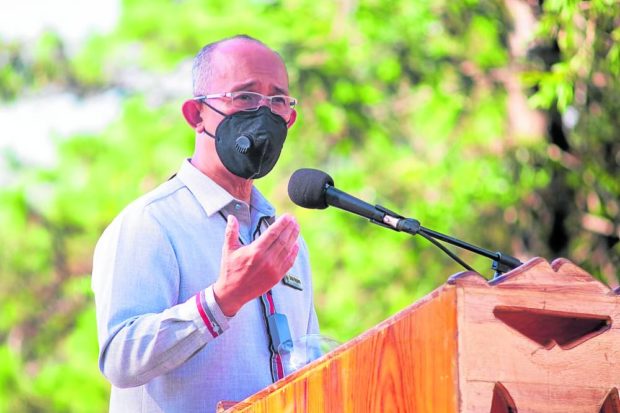Baguio mayor bans red-tagging posters, tarps
BAGUIO CITY, Benguet, Philippines — Mayor Benjamin Magalong has directed the police in Baguio City to take down any tarpaulin or poster that imply or explicitly tie local activists to the communist movement and its military arm, the New People’s Army.
Magalong, who chairs the Cordillera Regional Peace and Order Council, gave this order to Col. Glenn Lonogan, the city’s police director, on Saturday during a dialogue with activists, including students, who said they felt unsafe in the city after they were harassed online because they were falsely linked to communist rebels.
Members of the Cordillera People’s Alliance (CPA) and its affiliate organizations met Magalong, after these groups were declared persona non grata by two Baguio villages and labeled as “communist front organizations” in several other towns and provinces in the Cordillera.
Magalong said he would also ask for a review of how the Cordillera’s anti-insurgency program had been executed.
He acknowledged the “evil” that red-tagging does to the psyche of young people, adding it robbed “people of their dignity, especially if [these actions] are designed to destroy the reputation of people.”
“If you don’t feel safe in Baguio, that means I have problems as the chief executive,” Magalong told the group.
He told the city police to stop groups from installing tarpaulins or posters that Red-tagged activists.
“Those posters are now prohibited,” he told, Lonogan, who was present in the meeting.
Threats
Louise Montenegro, a student of the University of the Philippines Baguio, said she had been “humiliated” and threatened with rape or physical assault online because of social media posts identifying her as a “communist terrorist” that could have been generated or shared by the police and some government agencies.
Montenegro, who is not a resident of the city, informed Magalong that these threats made her and other young activists fearful about remaining in Baguio.
“The attacks have tarnished our home here in the city … Having our parents see those [messages] have also been of great concern for us,” she said.
Montenegro was among the students who petitioned a local court for a writ of amparo in March 2021, which required the police to track and shut down 24 Facebook accounts responsible for a smear campaign targeting the youths, said their counsel, human rights lawyer Francesca Macli-ing Claver.
Six of these accounts turned out to have emerged from official social media pages of police offices in the Cordillera, which were eventually taken down, she said.
“We are not communists [and] we are not rebel combatants,” said Jeoff Larua, secretary general of Tongtongan ti Umili, but were labeled as such even by the police, endangering their lives and their families.
Red-tagging in the summer capital could also be a “precursor” to more sinister actions like falsified criminal charges or extrajudicial killings, added CPA chair Windel Bolinget, who was recently acquitted of a murder complaint filed by the police in the Davao region, which he had never visited.
